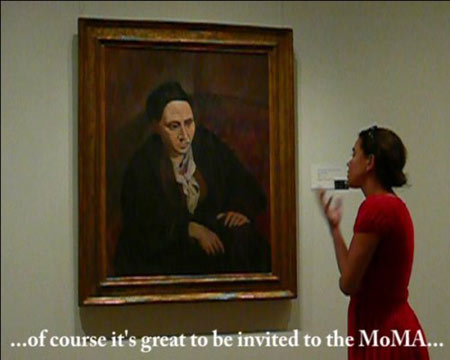
hug us on facebook
or join the gang and post yourself
• elsewhere
Hall Of Fame
Directors Lounge
is kindly supported by

Cocoon and other Swan Songs — Felice Naomi Wonnenberg
curated by Klaus W. Eisenlohr
Felice Naomi Wonnenberg's video work is a unique, sometimes surrealist collage inspired by Jewish thought and political and gender issues. It combines in an intriguing manner Middle-Eastern reality with European cinematographic aesthtics. The Tel Aviv and Berlin based artist has been showing her video works and experimental films internationally since 1998, among others at the Directors Lounge, Berlin (2005), in the MoMA Museum of Modern Art New York (2007), The Israel Museum Jerusalem (2007), the Jewish Film Festival Berlin and in Goethe Institutes worldwide. She was awarded the ARTE / 3Sat prize for artistic innovation, her work was repeatedly screened on 3SAT (German speaking art TV channel) and in over 30 international film festivals. In 2001 she graduated from the Masterclass of the Berlin Art Academy (HdK Berlin – UdK) (the highest degree in visual art in German art academies). She has been living and working in Israel and Berlin as an artist, art critic and in museums since 2005. Her experimental films are shot on 16mm film (a format launched in 1923, used by surrealist and dadaist artists and later in WW2) and she also works with digital video. pressrelease
some of the films included:Jewel Garden experimental documentary, digital video, 10 mins, 2006 "...a delightful...wonderfully inventive film and...great addition to our program" writes William Sloan, curator of MoMA - The Museum of Modern Art, NY Portrait of an old 2nd-hand jewelry dealer on Berlin's shopping-mile Ku'damm. In an uncut 9 min. close-up shot, the camera glides over the glittering necklaces, war medals, Jewish Chanukah candlesticks, worn-out wedding rings and other broken dreams on sale. We never get to see the dealer, but we do hear him chat about his theories on love.
Cocoon, Performance on digital video, 9 mins, 2007 Some young men wander in the desert. In a cave they make the chance discovery of a giant cocoon with female content... In the encounter the young men devour the cocoon, but then as they penetrate into it they do not even realize that the content of the cocoon is a woman. Their actions appear as a fickle mood of fate. The men destroy the woman's fragile protective wrap for a moments' culinary pleasure and leave her behind - deprived of her protection, desinterested in her fate. Cocoon is a video that brings visual inspirations from Man Ray's nude photographies and the sexy armpit from Luis Bunuel and Salvador Dali's Chien Chien Andalou onto a feminist panel. The viewers' sexual expectations are first stimulated and then playfully led ad absurdum. The cocoon is the poor worm's / woman's longing for transformation, the attempt to withdraw from the world in order to emerge as a new magnificent self. As in many of Wonnenberg's films the puzzling sexual encounters between man and woman remain unsatisfactory. Both parties do not recognize the others needs and desires and their physical contact remains at once naive and yet cruel and destructive. The location of the scenes is a metaphysical place in itself: Cocoon was shot on location at the caves of Qumran in the Judean desert on the shore of the Dead Sea, where in 1947 a Bedouin boy discovered, by coincidence, the oldest surviving Torah scrolls.
The Orient through Western Eyes video collage, 8 min, 2007 A video collage juxtaposing clips from early silent movies to modern fantasy blockbusters to show how the West has constructed its own image of "the Orient". This art video commissioned by Israel's biggest art museum The Israel Museum Jerusalem was shown in conjunction with its exhibition Eden- East and West. It is a critical visual analysis of the West's cinematographic fantasies of "the Orient". The Middle East and the Land of Israel were an important locus of Western longing, curiosity, fantasy, and apprehension of the “Other”, and these feelings were articulated visually by many artists. This art video juxtaposes clippings from existing footage of Hollywood movies, from their beginnings in the early days of silent movies (such as DeMille’s monumental biblical epics) to contemporary fantasy Blockbusters (such as The Lord of the Rings). The visual confrontations demonstrate how the West has constructed its own image of "the Jew", "the Arab", "the Orient" or -in brief - the necessary and fondly hated "Other" for its own psychological needs.
A Turtle‘s Life in the Middle East, 16 mm and Super 8 black/white and color, 10 mins, 2003 3Sat / ARTE Prize for Artistic Innovation This is an experimental documentary about fear and how to deal with it after a terror attack. The basis of the film is the childhood memory of a Palestinian, in which the need of protection turned into perverted and absurd violence. The child confronted his seeming enemies, the turtles. "I declared war on turtles...Until they were dead. Then I‘d be very satisfied.“ Contrasting this are an Israeli‘s angry comments. He cannot stand his German girlfriend's questioning him about terror attacks, which she needs for her documentary film, anymore. The images of the film stand in contrast to the interviews: a group of nervous birds and architectural shots of a prison relay the fear that the narrators struggle to repress. The film ends in bitter words juxtaposed with pictures of hope.
more on richfilm

![]()
Hall of Fame Directors Lounge is kindly supported by




 • Cafe Dix in der Berlinischen Galerie • Scala e.V.
• Cafe Dix in der Berlinischen Galerie • Scala e.V.
our heroes: placebo FX, Fragments, Berliner Licht & Silber, Cinema Desaster, monitoranimation.de,
Joppel-Bürkle IT,SIEBENGRUENDE, IF Museum/Inner Spaces, Fanhall Studio, Rote Loge


